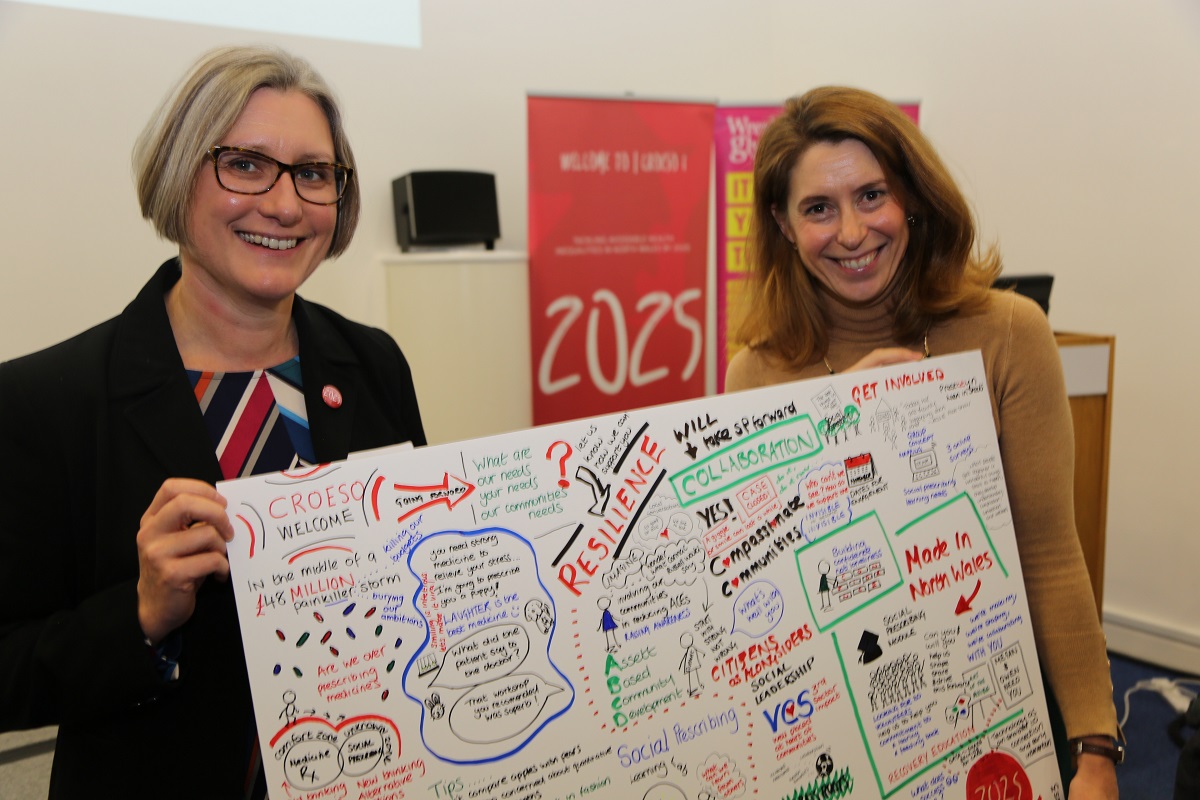Wrexham Glyndwr University sets out ground-breaking project to become first trauma-informed university in country

An innovative project aimed at transforming how trauma is approached in Welsh communities has been set out at a major public engagement conference.
Delegates at this year’s National Co-ordinating Centre for Public Engagement Conference heard from Head of Public Policy Engagement at Wrexham Glyndwr University, Nina Ruddle, about the way Glyndwr is working with partners across Wales to co-create its civic mission – listening to Welsh communities and working with them to tackle the issues they face.
The university’s ambition is to end social inequality across North Wales by 2030 - through this work, via its research, its staff and students, and through piloting and developing new ways approaches which will improve people’s lives.
As part of its civic mission work, Glyndwr has already developed a strong partnership with the 2025 Movement to tackle avoidable health inequalities – an ongoing mission which was shortlisted for the Guardian Public Service Awards 2019 for Public Health and Well-being.
The university co-created a systems leadership programme to drive whole systems change working with housing, Public Service Boards, the health board and more; built a bespoke community volunteering practice with third sector organisations in Wrexham; led and established a Community of Practice for Social Prescribing in North Wales with more than 300 members – and has undertaken many other community projects.
Now, Glyndwr is working to become a Trauma and Adverse Childhood Experience (TrACE)-informed institution – the first of its kind in the country.
This new focus means that people who may have encountered trauma or adverse childhood experiences will be given the opportunity to progress and thrive while at Glyndwr – and the university hopes, ultimately, to develop this approach so it can be embedded in communities right across Wales.
The project is being carried in partnership with the Welsh Government-funded and Public Health Wales-hosted ACE Support Hub.
Vicky Jones, North Wales Lead for the Hub, added: “It’s not about treating trauma and symptoms, it’s a fundamental approach recognising that adversity and trauma are a possibility for everyone and it’s about promoting opportunities for well-being, healing and recovery with everyone having a role.
“It’s underpinned by five core principles, including choice, collaboration, empowerment, where we help individuals recognise their strength and resilience factors and build on these - and it’s about prioritising physical and emotional safety that, ultimately, builds trust and trusted relationships.
“Using the Glyndwr work as a platform, we want every single person in North Wales to thrive, no matter who they are, where they are from, or what they have been through.”
Nina explained how the impact of this year’s coronavirus pandemic had emphasised to staff working on the project how important their work was.
She said: “This has really amplified our experience of trauma and vulnerability, and I think it’s even more important now we start shaping and understanding our approach to TrACE, in the university and with our wider community partners – that’s where it gets really exciting for me with the work we do across the region.”
At Glyndwr, the TrACE-informed model will work alongside the university’s on-going social inclusion work - which has seen the university rated the most socially-inclusive university in England and Wales by the Times and Sunday Times good University Guide for the past three years.
Glyndwr’s Deputy Vice-Chancellor, Professor Claire Taylor, said: “As the top university in England and Wales for Social Inclusion, this project absolutely fits with our commitment to widening access and participation.
“Our values of being accessible, supportive, innovative and ambitious guide all that we do and this forms an essential framework for our partnership working.”
“The TrACEs approach chimes really well with our purpose and our approach to civic mission, which is all about tacking social inequalities.”
Alongside the direct work on developing Glyndwr as a trauma-informed university, there will also a stronger research focus on the issue led by Glyndwr.
Dr Caroline Hughes, Associate Dean in Glyndwr’s Faculty of Social and Life Sciences, is the academic lead for the project.
She said: “A research-informed approach is imperative.
“We plan to connect PhD students who are exploring ACEs and trauma across universities in Wales into a research network, which will create a community of practice where members can share ideas and share knowledge.”
As this community grows, the work of researchers such as Tegan Brierley-Sollis, a PhD candidate and Graduate Teaching Assistant at Glyndwr, who is examining trauma informed-practice, will be crucial.
She said: “ Glyndwr University has honestly changed my life. There is an over-arching belief at Glyndwr that students can succeed in their studies and make a real difference to their life.
“That belief is incredibly important, especially for those students that have never had anyone believe in them before
“We are creating a university where adversity is met with kindness, patience, and understanding. We are creating a safe space for our community which sparks passion through opportunity and sends the message that there is no ceiling to what we can achieve.
“Yes, I am helping to shape the future of Glyndwr through this research project, but Glyndwr has helped to shape me - by empowering me to recognise my own strengths, providing me with the most amazing opportunities, and believing in my abilities.”